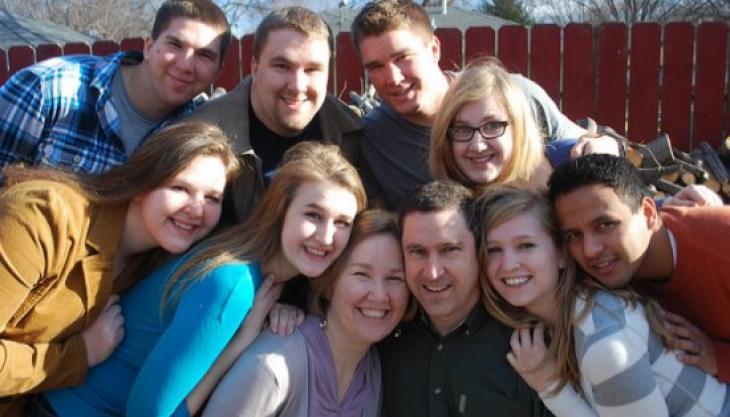Why the Chapter 7 Means Test Is Harder on Large Families and How to Fight Back
Submitted by Rachel R on Tue, 07/29/2014 - 11:49am

Large families have a harder time with the bankruptcy means test
Image source: Flickr Creative Commons User Family Hodgson
The bankruptcy reform that was pushed through back in 2005 was intended to keep people from taking advantage of the system. Instead, what has happened is that many people that legitimately need the financial assistance that bankruptcy provides are blocked from getting help. This is particularly true when it comes to larger families who may struggle to pass the bankruptcy means test even though they truly are cash-strapped and can't service their debts. If you've got a big family, here's how you can fight back to get the financial relief you deserve.
How allowances are unfair to larger families
In order to determine if you're eligible to file Chapter 7 bankruptcy, you have to pass the Means Test. This looks at how much you're earning versus your expenses to determine if you have the means to pay your bills. The IRS updates allowable expenses each year based on Bureau of Labor Statistics research. Here's why they're unfair. If you have a family size of just one, your food allowance for 2014 is $315. That's not a lot of money, but you could probably get by on $78 a week if you had to. But for a family of four, the food allowance is only slightly higher than double what is allotted for an individual at $794.
For a family of four, that equates to $198 per month per person or less than $50 a week. Who can live on that? For clothing costs, an individual can use an $88 allowance, but a family of four gets just $244, less than three times the single allowance for four times as many people. How is this fair? For personal care products and services, an individual can claim $34 while a family of four gets just $70. This covers haircuts, razors, soap, shampoo, toothbrushes, etc. Again, this seems out of whack.
Allowances get even tighter on families with more than two kids
If you are married and have more than two children living at home, the Means Test allowances are even more harsh. For each family member above four, you get an additional $298. But here's what's ridiculous about that. Going from one to two family members, you get an additional $509 for the second person, yet the fifth, sixth and additional people get you only $298 extra.
Some expenses won't increase too much by the addition of extra people – utilities, rent, car note, etc – and you should be able to deduct those at actual levels. But for the other necessities of living – food, housekeeping supplies, clothing, personal services, personal care products and other non-rent/utility type expenses, larger families are being held to a much stricter standard than single or two member household families.
Tips to get a better deal on the Means Test for your large family
There are some ways to fight back against these unfair standards and that's by taking advantage of all additional allowances and line items where you can go above the allowance if you can show your actual expenses are more. Consider these expenses:
#1 Health and medical expenses
Each family member that's under the age of 65 gets just a $60 monthly standard allowance ($144 if you're over 65), but your actual expenses may exceed this and, if so, you can use your actuals. This includes any doctor expenses not covered by insurance including co-pays, costs of prescription drugs, eyeglasses, contact lenses, over the counter medications, vitamins, braces, teeth cleanings, etc.
#2 Charitable donation expenses
If you regularly tithe to your church, have a recurring United Way donation taken out of your paycheck or any other regular charitable donations, you can deduct these according to your actual expenses.
#3 Help to family members
If you contribute to the costs of caring for elderly family members, those that have special needs or disabilities, these can also be deducted on your Means Test.
#4 Educational expenses
If you're required to take classes for your job, these can be deducted. If your child needs a tutor or other schooling costs, you can take up to $125 per month on the Means Test. If your child has special needs, there is no cap and you can deduct your actual expenses.
If you're in over your head with bills, Chapter 7 bankruptcy can be a means to a financial fresh start, but it's important to file wisely. Contact the North Carolina bankruptcy experts at the law offices of John T Orcutt for assistance in getting the relief you need.
Debts Hurt! Got debt? Need help? Get started below!
Serving All of North Carolina
- Bankruptcy Attorneys Raleigh NC (North)
- Bankruptcy Attorney Fayetteville NC
- Bankruptcy Attorney Durham NC
- Bankruptcy Attorneys Wilson NC
- Bankruptcy Attorneys Greensboro NC
- Bankruptcy Attorneys Southport NC
- Bankruptcy Attorneys Wilmington NC
Bankruptcy Attorneys Raleigh NC (North)
6616 Six Forks Rd #203 Raleigh, NC 27615 North Carolina
Tel: (919) 847-9750

Bankruptcy Attorney Fayetteville NC
2711 Breezewood Ave Fayetteville, NC 28303 North Carolina
Tel: (910) 323-2972

Bankruptcy Attorney Durham NC
1738 Hillandale Rd Suite D Durham, NC 27705 North Carolina
Tel: (919) 286-1695


Bankruptcy Attorneys Greensboro NC
2100 W Cornwallis Dr. STE O Greensboro, NC 27408 North Carolina
Tel: (336) 542-5993

Bankruptcy Attorneys Southport NC
116 N Howe St. Suite A Southport, NC 28461 North Carolina
Tel: (910) 218-8682

Bankruptcy Attorneys Wilmington NC
116 N. Howe Street, Suite A Southport, NC 28461 North Carolina
Tel: (910) 447-2987
